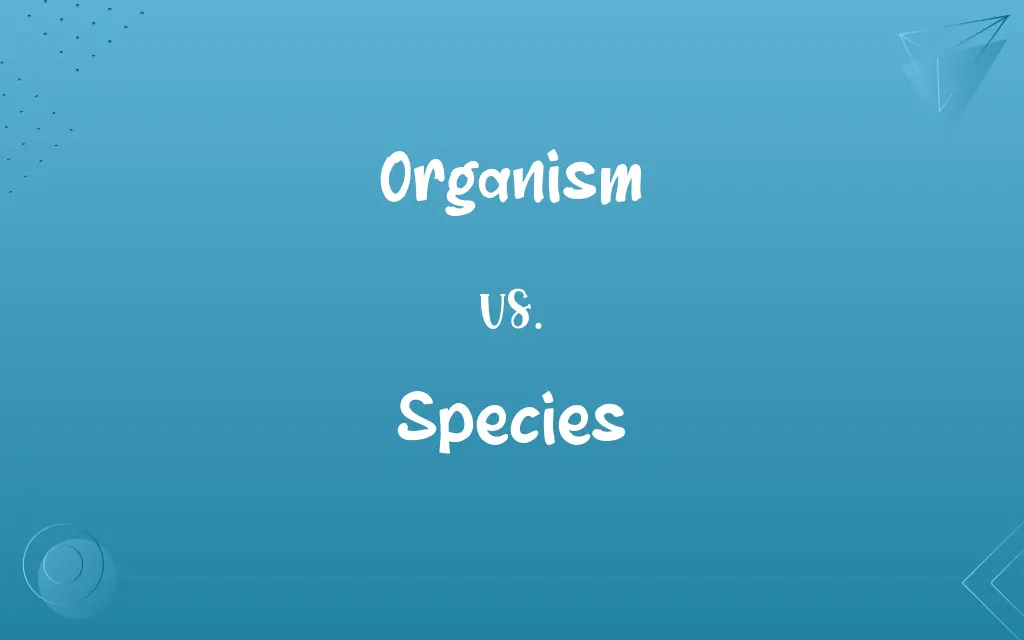Organism vs. Species: Know the Difference

By Shumaila Saeed || Updated on December 25, 2023
An organism is an individual living entity, while a species is a group of similar organisms capable of interbreeding.

Key Differences
An organism refers to any individual living entity, be it a plant, animal, fungus, bacterium, or archaeon. It is a single, self-contained unit of life. On the other hand, a species is a classification category that includes a group of organisms sharing common characteristics and genetic makeup, capable of breeding with each other.
Shumaila Saeed
Dec 06, 2023
Organisms vary widely in size, form, and function, ranging from microscopic bacteria to gigantic whales. Each organism operates as a distinct entity with its unique biological processes. Species, in contrast, represent a collective term for similar organisms that share a common gene pool and can produce fertile offspring.
Shumaila Saeed
Dec 06, 2023
The life of an organism involves various stages, including birth, growth, reproduction, and death. This life cycle is specific to each organism. Conversely, a species encompasses a broader concept, focusing on the evolutionary lineage and genetic continuity over generations.
Shumaila Saeed
Dec 06, 2023
Organisms interact with their environment at an individual level, adapting and responding to changes for survival. Species, however, are studied in the context of populations and ecosystems, highlighting their role in biodiversity and ecological balance.
Shumaila Saeed
Dec 06, 2023
Each organism possesses unique genetic information, which determines its characteristics. In contrast, species are defined by shared traits and genetic similarities, forming a distinct group within the larger taxonomic hierarchy.
Shumaila Saeed
Dec 06, 2023
ADVERTISEMENT
Comparison Chart
Definition
An individual living entity.
A group of similar organisms capable of interbreeding.
Shumaila Saeed
Dec 06, 2023
Focus
Individual life processes and characteristics.
Genetic similarities and breeding capabilities among a group.
Shumaila Saeed
Dec 06, 2023
Scale
Singular and self-contained.
Collective and encompassing multiple individuals.
Shumaila Saeed
Dec 06, 2023
Role
Functions and interacts within its immediate environment.
Represents a group within an ecosystem, contributing to biodiversity.
Shumaila Saeed
Dec 06, 2023
Study
Studied at the individual level.
Studied at the population or community level.
Shumaila Saeed
Dec 06, 2023
ADVERTISEMENT
Organism and Species Definitions
Organism
Any living thing that can act or function independently.
A bacteria, though microscopic, is an organism capable of surviving in diverse environments.
Shumaila Saeed
Dec 06, 2023
Species
A group of similar living organisms capable of exchanging genes or interbreeding.
The Bengal tiger is a species known for its distinctive stripes.
Shumaila Saeed
Dec 06, 2023
Organism
An individual form of life, such as a plant, animal, or bacterium.
A blue whale is an organism known for its immense size.
Shumaila Saeed
Dec 06, 2023
Species
A class of individuals having common attributes and designated by a common name.
The species of apple trees are known for producing fruits with varying tastes.
Shumaila Saeed
Dec 06, 2023
Organism
A complex structure of interdependent and subordinate elements whose relations and properties are largely determined by their function in the whole.
An individual ant, although simple, forms part of a complex organism known as a colony.
Shumaila Saeed
Dec 06, 2023
ADVERTISEMENT
Species
A basic unit of biological classification and a taxonomic rank.
The species of red oak is known for its hard wood and autumn foliage.
Shumaila Saeed
Dec 06, 2023
Organism
A single, living entity that performs vital life processes.
A single oak tree is an organism that photosynthesizes to produce energy.
Shumaila Saeed
Dec 06, 2023
Species
A category of biological classification immediately below genus, comprising related organisms that share common characteristics and are capable of interbreeding.
The human species, Homo sapiens, is characterized by advanced cognitive abilities.
Shumaila Saeed
Dec 06, 2023
Organism
A life form characterized by the ability to grow, reproduce, and maintain homeostasis.
A mushroom, though often overlooked, is a complex organism.
Shumaila Saeed
Dec 06, 2023
Species
(Biology) A group of closely related organisms that are very similar to each other and are usually capable of interbreeding and producing fertile offspring. The species is the fundamental category of taxonomic classification, ranking below a genus or subgenus. Species names are represented in binomial nomenclature by an uncapitalized Latin adjective or noun following a capitalized genus name, as in Ananas comosus, the pineapple, and Equus caballus, the horse.
Shumaila Saeed
Oct 19, 2023
Organism
An individual form of life, such as a bacterium, protist, fungus, plant, or animal, composed of a single cell or a complex of cells in which organelles or organs work together to carry out the various processes of life.
Shumaila Saeed
Oct 19, 2023
Species
(Logic) A class of individuals or objects grouped by virtue of their common attributes and assigned a common name; a division subordinate to a genus.
Shumaila Saeed
Oct 19, 2023
Organism
A system regarded as analogous in its structure or functions to a living body
The social organism.
Shumaila Saeed
Oct 19, 2023
Species
(Chemistry) A set of atoms, molecules, ions, or other chemical entities that possess the same distinct characteristics with respect to a chemical process or measurement.
Shumaila Saeed
Oct 19, 2023
Species
A kind, variety, or type
"No species of performing artist is as self-critical as a dancer" (Susan Sontag).
Shumaila Saeed
Oct 19, 2023
Organism
Something with many separate interdependent parts, seen as being like a living thing; an organic system.
Shumaila Saeed
Oct 19, 2023
Species
The outward appearance or form of the Eucharistic elements that is retained after their consecration.
Shumaila Saeed
Oct 19, 2023
Organism
(biology) A discrete and complete living thing, such as animal, plant, fungus or microorganism.
Shumaila Saeed
Oct 19, 2023
Organism
An organized being; a living body, either vegetable or animal, composed of different organs or parts with functions which are separate, but mutually dependent, and essential to the life of the individual.
Shumaila Saeed
Oct 19, 2023
Species
A group of plants or animals having similar appearance.
This species of animal is unique to the area.
Shumaila Saeed
Oct 19, 2023
Organism
A living thing that has (or can develop) the ability to act or function independently
Shumaila Saeed
Oct 19, 2023
Species
A category in the classification of organisms, ranking below genus; a taxon at that rank.
Shumaila Saeed
Oct 19, 2023
Organism
A system considered analogous in structure or function to a living body;
The social organism
Shumaila Saeed
Oct 19, 2023
Species
(mineralogy) A mineral with a unique chemical formula whose crystals belong to a unique crystallographic system.
Shumaila Saeed
Oct 19, 2023
Species
(obsolete) The image of something cast on a surface, or reflected from a surface, or refracted through a lens or telescope; a reflection.
I cast the species of the Sun onto a sheet of paper through a telescope.
Shumaila Saeed
Oct 19, 2023
Species
Visible or perceptible presentation; appearance; something perceived.
Shumaila Saeed
Oct 19, 2023
Species
(Christianity) Either of the two elements of the Eucharist after they have been consecrated.
Shumaila Saeed
Oct 19, 2023
Species
Coin, or coined silver, gold, or other metal, used as a circulating medium; specie.
Shumaila Saeed
Oct 19, 2023
Species
Visible or sensible presentation; appearance; a sensible percept received by the imagination; an image.
Wit, . . . the faculty of imagination in the writer, which searches over all the memory for the species or ideas of those things which it designs to represent.
Shumaila Saeed
Oct 19, 2023
Species
A group of individuals agreeing in common attributes, and designated by a common name; a conception subordinated to another conception, called a genus, or generic conception, from which it differs in containing or comprehending more attributes, and extending to fewer individuals. Thus, man is a species, under animal as a genus; and man, in its turn, may be regarded as a genus with respect to European, American, or the like, as species.
Shumaila Saeed
Oct 19, 2023
Species
In science, a more or less permanent group of existing things or beings, associated according to attributes, or properties determined by scientific observation.
Shumaila Saeed
Oct 19, 2023
Species
A sort; a kind; a variety; as, a species of low cunning; a species of generosity; a species of cloth.
Shumaila Saeed
Oct 19, 2023
Species
Coin, or coined silver, gold, or other metal, used as a circulating medium; specie.
There was, in the splendor of the Roman empire, a less quantity of current species in Europe than there is now.
Shumaila Saeed
Oct 19, 2023
Species
The form or shape given to materials; fashion or shape; form; figure.
Shumaila Saeed
Oct 19, 2023
Species
A specific kind of something;
A species of molecule
A species of villainy
Shumaila Saeed
Oct 19, 2023
Species
A natural population of organisms that have similar genetics, behavior, and interactions with the environment.
The monarch butterfly is a species renowned for its migratory patterns.
Shumaila Saeed
Dec 06, 2023
Repeatedly Asked Queries
Can different species produce organisms together?
Generally, different species cannot interbreed to produce viable offspring.
Shumaila Saeed
Dec 06, 2023
Is a virus considered an organism?
The classification of viruses as organisms is debatable due to their dependency on host cells for reproduction.
Shumaila Saeed
Dec 06, 2023
What is biodiversity?
Biodiversity is the variety of life in the world or in a particular habitat or ecosystem, including the variety of species.
Shumaila Saeed
Dec 06, 2023
Is species classification permanent?
Species classification can change with new scientific discoveries and understandings.
Shumaila Saeed
Dec 06, 2023
How many species exist on Earth?
The exact number is unknown, but estimates range in the millions.
Shumaila Saeed
Dec 06, 2023
How do organisms within a species vary?
Organisms within a species can vary slightly due to individual genetic differences.
Shumaila Saeed
Dec 06, 2023
How are new species formed?
New species can form through processes like evolution, natural selection, and genetic mutation.
Shumaila Saeed
Dec 06, 2023
Do all organisms of a species look identical?
No, there can be variations in appearance within a species.
Shumaila Saeed
Dec 06, 2023
What role do organisms play in an ecosystem?
Organisms interact with each other and their environment, playing specific roles in their ecosystems.
Shumaila Saeed
Dec 06, 2023
What defines a species?
A species is a group of similar organisms capable of interbreeding.
Shumaila Saeed
Dec 06, 2023
Can organisms belong to more than one species?
No, an organism belongs to only one species.
Shumaila Saeed
Dec 06, 2023
Can a species change over time?
Yes, species can evolve and change over time.
Shumaila Saeed
Dec 06, 2023
Are all members of a species found in the same location?
No, members of a species can be distributed in various locations.
Shumaila Saeed
Dec 06, 2023
Can domestication create new species?
Domestication can lead to the development of breeds or varieties, but these typically remain within the same species.
Shumaila Saeed
Dec 06, 2023
Can organisms of the same species have different behaviors?
Yes, behavior can vary within a species due to environmental and genetic factors.
Shumaila Saeed
Dec 06, 2023
Can organisms from different species communicate?
While communication styles differ, some inter-species communication is observed, especially among intelligent animals.
Shumaila Saeed
Dec 06, 2023
How does extinction affect a species?
Extinction results in the complete disappearance of a species from Earth.
Shumaila Saeed
Dec 06, 2023
What is a subspecies?
A subspecies is a taxonomic category that ranks below species, often distinguished by minor but distinct morphological differences.
Shumaila Saeed
Dec 06, 2023
How do scientists classify organisms into species?
Scientists use physical characteristics, genetic similarities, and the ability to interbreed as criteria for species classification.
Shumaila Saeed
Dec 06, 2023
Share this page
Link for your blog / website
HTML
Link to share via messenger
About Author
Written by
Shumaila SaeedShumaila Saeed, an expert content creator with 6 years of experience, specializes in distilling complex topics into easily digestible comparisons, shining a light on the nuances that both inform and educate readers with clarity and accuracy.








































































